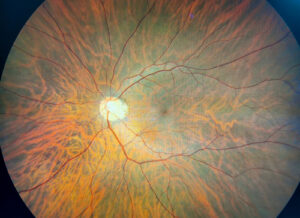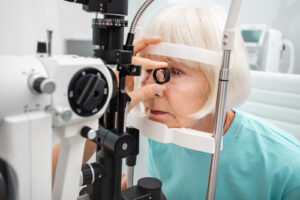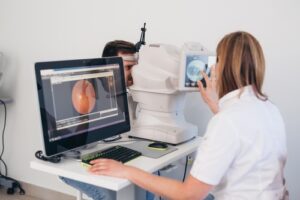Central serous chorioretinopathy (CSC) is an eye condition where fluid builds up under the retina. The accumulation of fluid causes gradual or sudden vision loss as the central retina or macula detaches.
The retina is the light-sensitive tissue found at the back of your eye. It turns light entering the eye into electric signals and sends it to the brain.
The brain then interprets these signals into the images you see. Keep reading to learn more about central serous chorioretinopathy!
How Does Central Serous Chorioretinopathy Affect the Eye?

In central serous chorioretinopathy, fluid leaks from the layer of blood vessels underneath the retina, known as the choroid. In between the choroid and retina is another layer of cells called the retinal pigment epithelium.
This water-tight barrier prevents fluid from the choroid from leaking into your retina. Sometimes, there can be a defect in the retinal pigment epithelium that causes it to break down.
Consequently, fluid from the choroid can seep through the retinal pigment epithelium and accumulate under the macula. As the fluid builds up, it forms a blister-like bump in the macula or central part of the retina, which is most important for straight-ahead vision.
Central serous chorioretinopathy primarily affects one eye. But in some cases, it can affect both.
The effects of the condition are typically temporary, and most patients recover good vision. Additionally, central serous chorioretinopathy is more common in men than women and often occurs between the ages of thirty and fifty years.
Still, older or younger men and women can also develop the condition.
How does Central Serous Chorioretinopathy Affect Vision?
The blister of fluid decreases your vision in two ways. The blister can lift the retina from the underlying tissue, supplying it with nutrients and oxygen.
When the retina doesn’t receive oxygen and nutrients as efficiently as it should, it does not work properly, resulting in vision changes. Since the retina has been elevated from its normal position, it can also cause images to move out of focus.
What Are the Symptoms of Central Serous Chorioretinopathy?
The most common symptom of central serous chorioretinopathy is distorted or blurry vision. You may experience blurry vision suddenly or gradually as fluid collects under your macula and causes it to detach.

Other symptoms of central serous chorioretinopathy include:
- A dark spot or smudge in the center of your vision
- Straight lines appearing wavy, bent, or crooked
- Objects appearing farther away or smaller than they actually are
- White objects looking dull in color or appearing to have a brown tinge
The symptoms of central serous chorioretinopathy can significantly interfere with your everyday activities like reading and driving, which may affect your quality of life. When the fluid beneath the retina is not under the macula, you may not experience any symptoms.
Causes and Risk Factors of Central Serous Chorioretinopathy
Eye doctors don’t know the specific cause of central serous chorioretinopathy. However, certain factors can increase your risk of developing the condition. They include:

- Being male
- Too much stress
- Pregnancy
- Heart disease
- High blood pressure
- Using steroid medications
- Autoimmune diseases like rheumatoid arthritis or lupus
- Having type A personality (impatient, ambitious, competitive)
- Certain medications
Central Serous Chorioretinopathy Treatment
In some cases, treatment is not necessary. The fluid may clear on its own without intervention, and vision symptoms resolve within weeks.
In such cases, the eye doctor will keep a watchful eye for any complications and ensure the leaked fluid is reabsorbed. However, in other cases, the fluid under the macula may not resolve on its own.
So, timely treatment is required to prevent the permanent worsening of vision. Your eye doctor may recommend treatment if your central serous chorioretinopathy doesn’t resolve within three to six months.
Some of the treatment options used include:
Medications
Your eye doctor can prescribe medications such as anti-vascular endothelial growth medications (anti-VEGF) to prevent the growth of new blood vessels in your retina and improve vision. Certain diuretics can also be given to help reduce fluid.
Photodynamic Therapy
With photodynamic therapy, your doctor will inject a light-sensitive drug known as verteporfin into your arm. Verteporfin then travels to your eye and is activated by shining a cold laser on the source of the leak.
This helps close the leak and improve vision. Photodynamic therapy can also prevent future leaks from recurring in some eyes.
Thermal Laser Treatment
In thermal laser treatment, your ophthalmologist will use a heated laser to seal leaks and reduce fluid buildup under your retina. Thermal laser treatment is effective if the leaking spot isn’t at the very center of the macula.
Otherwise, the laser may lead to the development of scar tissue that can permanently damage your vision.
Lifestyle Changes
Your eye doctor may also suggest lifestyle changes such as:
- Minimizing caffeine intake
- Avoiding alcoholic drinks
- Reducing stress levels
- Good nutrition and exercising regularly
What is the Typical Prognosis For Central Serous Chorioretinopathy?

Overall, the prognosis of central serous chorioretinopathy is good. Most patients recover their vision within a couple of weeks or months without treatment, and the condition only happens once.
If the fluid doesn’t drain within three to six months without intervention, you’ll need treatment. Your eye doctor will determine the best treatment plan depending on the timeline and severity of your symptoms.
Your vision can improve partially, or you may regain all of your eyesight after fluid drains with or without treatment. It’s important to note that successful treatment doesn’t guarantee that central serous chorioretinopathy won’t reoccur down the road.
It may return in either eye months or years later.
Prevent the Permanent Loss of Your Central Vision
Medical intervention isn’t always required with central serous chorioretinopathy. However, it’s very important to see the experienced eye doctors at Joshi Retina Institute if you’re experiencing sudden or gradual vision loss to ensure it doesn’t become permanent.
Are you experiencing any signs of central serous chorioretinopathy? Schedule an appointment at Joshi Eye Institute in Boynton Beach, FL, today!



